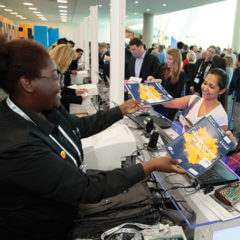It’s a common conundrum: Your attendees want to explore the city, but where should they go? Which bars are beloved by locals? Which restaurants have the tastiest food or the coolest views?
Sometimes, it helps to ask the experts. For its 2017 International Convention in San Diego on June 19–22, the Biotechnology Innovation Organization (BIO) partnered with Yelp, the online review site, to produce a guidebook on the city’s top options for food, drinks, and diversions. The 20-page booklet, which was inserted in 16,000 attendee bags, included 39 restaurants and bars, along with five activities and attractions such as tours and parks. The choices were featured in eight categories, from can’t-miss places for craft beers to great restaurants for groups, hot new favorites to must-see rooftop bars, quick breakfast spots to fine dining.
[pullquote class=“left”]Best of all? Yelp not only provided the content, but it designed the booklet — free of charge.[/pullquote]
For attendees, it was like receiving insider advice from restaurant-savvy locals. The guidebook picks came from the area’s Yelp contributors — or Yelpers, as they’re known — who have sampled the city’s culinary choices on a plate-by-plate basis. Best of all? Yelp not only provided the content, but it designed the booklet — free of charge.
GUIDE AND SEEK
The idea originated several months earlier in a brainstorming session for BIO 2017’s social-media campaign. As four team members discussed ways to promote San Diego, the conversation turned to Yelp — which wasn’t surprising. “I’m addicted to Yelp — all of us around the table were obsessed with it,” said Erin Lee, managing director of marketing and event technology for BIO, which represents biotech companies, academic institutions, state biotech centers, and related organizations in the United States and more than 30 other countries.

After a full program of sessions, attendees could take advantage of curated recommendations to savor San Diego.
Lee wondered if Yelp would help BIO create a “Best of San Diego” guide. She turned to Willie Reaves, BIO’s director of partnering products and services, who has “D.C. Elite” Yelp status. “Elite squad” members are Yelp’s most active users, and they must meet certain standards to qualify, such as contributing well-written reviews and offering high-quality tips. Reaves contacted Brad Bohensky, Yelp’s San Diego marketing and community director, about working together on the project.
“Yelp liked the idea — they’d never done it before,” Lee said. To get Yelp fully on board, she shared the convention’s attendee profile and economic impact. BIO has hosted three conventions in San Diego over the last 10 years, including BIO 2014, which brought 15,667 attendees to the city and ranked sixth among its convention-center events, with an economic impact of $53 million. “We have high-level business-development executives and attendees from 72 countries,” Lee said. “Once I validated this information and told them, ‘These are big spenders who have good taste, and who want to know about craft breweries and local flavor,’ they were excited.”
Yelp designed and curated the guide based on attendee interests. “The attendee base likes fine dining,” Lee said. “But we also wanted to capture the spirit of San Diego, and get people out of the Gaslamp Quarter to places they might not necessarily go.” Because many attendees value a healthy lifestyle, the guide also included vegan and vegetarian options.
‘A HUGE WIN’
The final product was colorful, useful, and popular. “We got a lot of great feedback,” Lee said. “It was a huge win for our international audience to get that kind of welcome to San Diego.”
It was also a big win for Yelp. “The BIO convention had attendees from around that globe that may not have known about the scale of Yelp in a city like San Diego,” Bohensky said. “The guidebook allowed Yelp’s digital content to take a physical, tangible form that people could quickly digest.”
Because Yelp covered the costs (other than printing), it controlled the booklet’s look and voice. BIO’s branding was limited, but the Yelp and BIO logos both appeared on the front cover, and an ad for BIO 2018 was featured on the back.
What would Lee do differently? Yelp’s main goal was to get exposure to international attendees and encourage them to download and use its app, but BIO couldn’t accommodate one request. “They wanted to have a Yelp welcoming committee at one of our receptions and invite their local featured ambassadors. They wanted to say, ‘Hey, have you made your restaurant reservations for Tuesday or Wednesday night? Let me help you! Do you have the Yelp app?’” Lee said. “It was a great idea, but it was late in the planning and it wasn’t something we could accommodate.” Because of that, Yelp didn’t get “in-person visibility,” Lee said. “That would be on their wish list to do differently next time.”
In the future, she also wants to track engagement and show that BIO attendees are spending money at the establishments featured in the guide. “When you use the Yelp app,” Lee said, “you’re usually incentivized to check in with a discount or a free appetizer.” She wanted to incorporate discounts into the booklet, but it was produced two months before the convention, and discounts aren’t usually planned that far in advance.
Lee is also interested in starting a program through which attendees who show their convention badge receive a discount, or a free drink or appetizer, from participating vendors.
BIO is considering partnering with Yelp for its 2018 International Convention in Boston, although the decision depends on the company’s local community director. “I definitely want to do it again,” Lee said. “We’re focused on the customer experience, and touch points like this really make an impact.”



